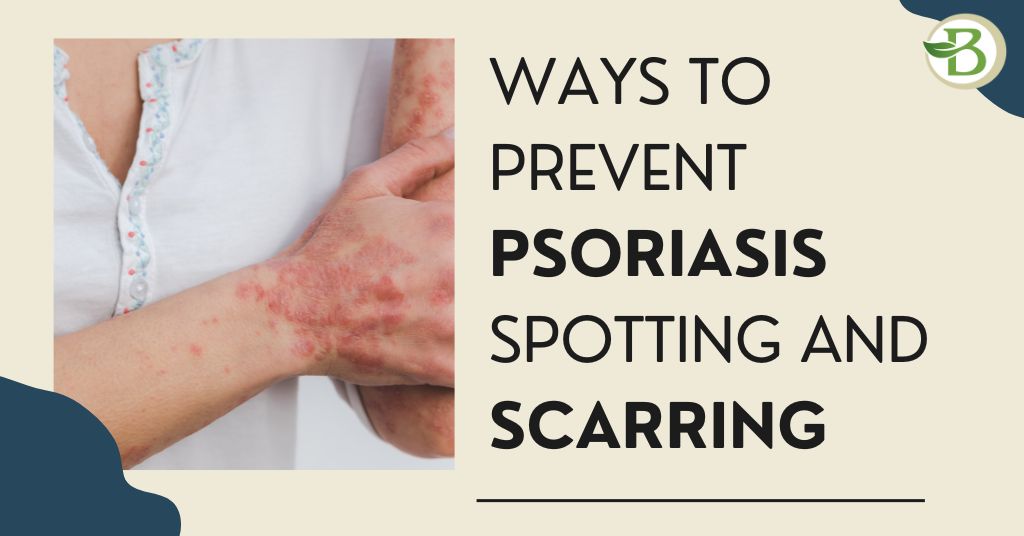What Are the Most Effective Ways to Prevent Psoriasis Spotting and Scarring?
Are your psoriasis patches resulting in the formation of white spots over the skin? Are you looking for ways to prevent this from happening? Well, psoriasis itself does not cause any type of spotting or scarring. However, itching or scratching the affected areas due to flare-ups may lead to the development of such spots. Preventing yourself from itching those patches will eventually prevent the development of spots and scars. Along with a well-curated medical treatment plan, there are many natural ways to control psoriasis flare-ups.
Approximately 2-3% of the global population is affected by the skin disease known as psoriasis. In this medical issue, a person may experience the development of white or red coloured (maybe both) scaly patches on various areas of the body. The exact cause behind the disease is yet to be discovered, but many scientists believe that it is an autoimmune disease, which arises due to the excessive formation of skin cells.
In some cases, it has been observed that psoriasis may also affect the pigmentation and leave marks on the skin even after the patches have gone. These psoriasis scars are not so common; only a few psoriatic patients may experience them. One can avoid the formation of such spots or scars by controlling their sensations of itching or scratching over psoriatic scales, as these two habits are responsible for the development of spots and scars.
Sometimes, these spots may appear due to the slow functioning of immune system which delays the production of melanocytes. However, this decolorisation from psoriasis often gets better with time. Let us now discuss about the cause of the formation of such spots and ways to prevent them in detail.
Slow or disturbed functioning of the Immune system can lead to Spots
One of the most long-term impacts of psoriasis is skin depigmentation over the affected areas. Psoriasis itself is an autoimmune disease caused by the malfunctioning of the immune system. By the time our immune system is not completely repaired, it may also face difficulty in performing other tasks, too. One such issue can be the disturbance or slow formation of melanocyte cells (cells responsible for skin pigmentation) in our body.
As the immune system is responsible for the production of melanocytes, any issue in its functioning may hamper the production of melanocytes. People may experience the development of spots that are lighter than their actual skin tone. Sometimes, these psoriasis spots can be darker than the original skin tone, known as hyperpigmentation, but this is quite rare.
These psoriasis scars will eventually go away with time. It may take 3 to 12 months to achieve even skin. However, certain lifestyle and dietary changes can help manage the immune system during psoriasis.
How to take care of the immune system health with Psoriasis?
Here are some tips to keep your immune system healthy while dealing with psoriasis:
Treating Infections;
Any type of skin infection, along with psoriasis, will eventually make the condition more challenging. A delay in its treatment may lead to the development of temporary or permanent spots. So, always consider every sign and symptom of your skin that may sound like an infection.
Control your time in the sun;
Cover your face with a scarf to protect it from harmful UV rays. Wearing long pants and full-sleeve blouses made with breathable fabric will protect the other areas of your skin from heat. Otherwise, the heat may increase the severity of the psoriatic patches and lead to spots and scars.
Managing stress;
Constantly thinking about the condition will not heal it. Such negative feelings can weaken the immune system and upset the hormone balance, leading to a number of health issues. Stress acts as a trigger for conditions such as psoriasis. More importantly, as we all know, psoriasis is an autoimmune disease; stress may act as a barrier to the healing of the immune system.
Check on Nutrition;
Here is a nutrition guide specifically for psoriasis patients. Including the below-mentioned foods in your daily meals will surely benefit.
- Omega-3 fatty acids can improve cardiovascular health, raise “good” cholesterol, and lower pressure for people with psoriasis.
- Foods rich in omega-3 fats include chia seeds, flax seeds, herring, salmon, sardines, shellfish, soybeans, and walnuts.
- Fresh plant-based foods with phytonutrients or compounds with anti-inflammatory and antioxidant properties are also beneficial.
- Healthy fats like avocado, dark chocolates and olive oil can help reduce inflammation.
- Eating high-quality protein foods, such as beans, eggs, lentils, and nuts.
- Vitamin D supplements may be beneficial, but there is limited research on their effectiveness for psoriatic patients.
- Natural sources of vitamin D include eggs, orange juice, tuna, and salmon.
Itching Psoriasis Patches Can Lead To Scars
Formation of scars is not usual in Psoriasis; only excessive itching over the affected areas can cause them. Psoriasis itch is caused by external stimuli, lesional inflammation, and psychological stress. Scratching promotes the secretion of neuropeptides, which act on C-fiber neurons to convey itch signals. Immune cells secrete cytokines that aggravate itch by enhancing inflammatory responses. Some responses also elicit itch by directly acting on nerve endings.
However, there are various ways to control and minimise such sensations with the help of natural remedies.
How to manage itch during Psoriasis flare-ups at home?
The best way to manage the itch associated with the condition is to manage the psoriasis triggers. However, certain natural remedies can be helpful.
Ice packs and cold compresses
Ice packs and cold compresses are easy ways to manage itchiness. Using a cold washcloth is another option. However, it’s important not to put ice directly on the skin to avoid frostbite. You can try wrapping the ice pack in a towel and applying it to each area for no more than 10 to 20 minutes at a time.
Bath with cold water
Taking baths and showers can help calm psoriasis scales, but it’s important to avoid hot water. Cool showers can reduce itching and inflammation, but they might also dry out the skin. To prevent dryness and itchiness, apply a natural moisturiser while the skin is still wet.
Apple cider vinegar
Apple cider vinegar can be beneficial for psoriasis symptoms, especially offering a natural relief for scalp psoriasis. It’s recommended to use it a few times a week, but if it causes a burning sensation, it should be diluted. It’s also important to avoid it on open wounds.
Coconut oil
Coconut oil acts as a natural treatment for psoriasis patches. It can be applied to the patches directly. It moisturises the skin, reduces inflammation, and fights bacteria, which can help with scalp redness and scaling.
Aloe vera
Aloe Vera is inhibits healing properties and can be used directly on the skin. It helps reduce itchiness, redness, and inflammation, and manages flaking. Regular use of aloe vera can lead to visible improvements in about a month.
So, these were various tips and tricks to manage and prevent the occurance of spots and scars due to psoriasis. All of these modifications along with a proper treatment plan may lead to fast recovery from the condition.
Bharat Homeopathy- An effective treatment for Psoriasis
Tried numerous treatment plans for psoriasis, but nothing worked for you? Psoriasis is a chronic condition which demands highly experienced medical professionals to achieve complete relief.
Our experts at Bharat Homeopathy have years of experience in dealing with psoriatic patients and providing them with a permanent solution for psoriasis Our method aims to boost the body’s natural healing abilities to reduce symptoms and achieve lasting relief. Unlike typical treatments that use creams or drugs with possible side effects, our homeopathic treatment for psoriasis is safe, mild, and non-invasive. Reach out to us today to explore our treatment plans.


